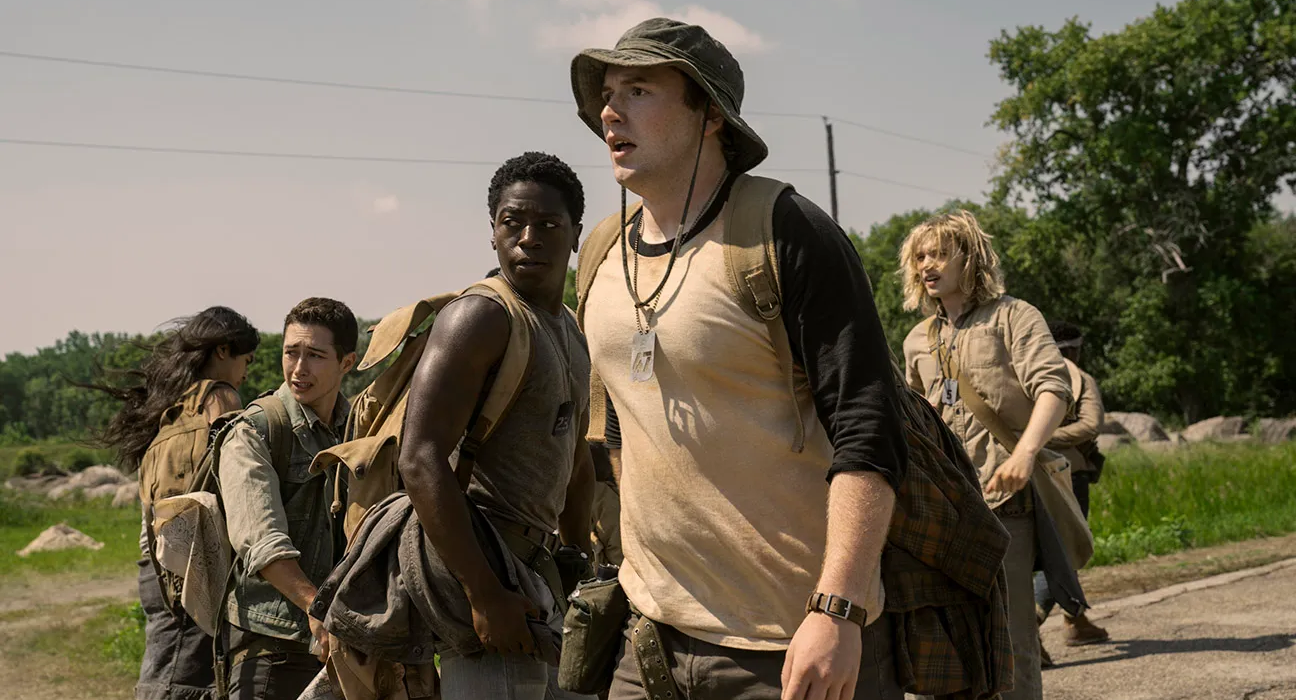“The Long Walk” (2025) Review
Director: Francis Lawrence Screenwriter: JT Mollner Cast: Cooper Hoffman, David Jonsson, Garrett Wareing, Tut Nyuot, Charlie Plummer, Ben Wang, Roman Griffin Davis, Jordan Gonzalez, Josh Hamilton, Judy Greer, Mark Hamill Distributor: Lionsgate Running Time: 108 min. MPAA: R
When the first person is killed with a gunshot in The Long Walk, it hits like a lightning bolt, even when you can see it coming from a mile away. One of the witnessing boys remarks that it gets easier to hear the longer they walk. Another remark, that’s what they’re afraid of. It’s a fear I shared as well for this dystopian picture that could too comfortably fall into the groove of teenagers being picked off for lagging. There was never a moment when the violence didn’t hit in this film, making for a highly engaging and provocative depiction of despair amid destitution and death.
The deadly game for prosperity in a decaying America is simple. Teenagers are given the choice to compete in a walking competition for a cash prize and a special wish, and the winner is the last one still walking. Any slowdown is treated as a warning. Too many warnings warrant a bullet, and not always one that kills instantly. Serving as game runner and announcer is the snarling Major (Mark Hamill), hiding behind reflective sunglasses and barking about how this game will build character and turn boys into men, boasting about how big our American balls will get by killing off the lazy.
The game is simple, but the players and their personalities are more intricate. Raymond Garraty (Cooper Hoffman) seems to be doing it for his tearful mother (Judy Greer), who drops him off. Peter McVries (David Jonsson) is used to struggles and violence, given the scar on his face. There’s the strong Stebbins (Garrett Wareing), the charming Arthur (Tut Nyuot), the scrappy Hank (Ben Wang), and the unstable bully Gary (Charlie Plummer). Everybody has a story that slowly gets revealed, as much as the environment that has decayed America into a state of fascism. The exchanges they have are genuine, speaking like teenage boys with crude jokes and desires for money and naked women. You get to know them so well that the terror of them being gunned down is nail-biting for being a question more when than if, where the few who die instantly will be lucky compared to what happens when the violence gets more gruesome and cruel with every mile.
The film spends little time with introductions, unfolding in a way that naturally divulges the dystopian struggle and the fury against a system that favors punishing weakness and culture. While the boys start their walking and talking on topics of fame and fortune, the discussion soon turns towards hatred for the Walk and the inhuman nature of the competition. Making this walk a choice is a deceptive excuse for its hideousness, revealing the barbarous nature of capitalism that radicalizes these young men in their final steps. Even the rules of the walk are revealed while en route, answering questions as they come. While watching Garraty drink from his canteen, I questioned whether their water is limited or if they can get a refill. As soon as Garraty requests a refill from the soldiers, my mind darted to what happens when nature calls, revealed in the most disgusting manner that I’m sure your imagination can deduce.
McVries perfectly communicates the story’s ethos, viewing this walk not as a race for prosperity but as a series of moments worth cherishing, where you can’t think of the dead bodies behind you or the ones further up the path. Such a somber yet comforting outlook on life brings a level of contentment to Garraty, a boy who could use something more than the revenge that drives him. As the walk gets rougher, so do the discussions about the ultimate goal, where psychological damage and destructive desires take hold in a way that makes most of the boys implode or explode of their own accord. One boy bullies another into losing his footing and dooming him to death, haunting the bully for the rest of the walk. A lesser story would’ve made that bloodlust take hold, but the blame and distrust that quickly boil to the top make this boy lose his mind as he denies his responsibility in taking a life. He is driven mad, and it’s easy to see why, given how shocking the various deaths become. Jaws are blown apart, brains are spilled, feet are bloodied, and legs are run over with treads. It hits so aggressively that the madness takes hold for most of the boys as the numbers dwindle, and all hope is lost.
Blistering with brutality and bonding, The Long Walk is an exceptionally poignant dystopian horror that goes the extra mile of intensity. The allegory is potent in its own right, but director Francis Lawrence puts so much effort into making this walk across the American countryside feel grand and grim. Money and manliness are little more than meaningless treats worth dying for, where fascist scumbags will convince it’s more honorable to die in the street than fighting against oppressors. While additionally contemplating the nature of revenge and purpose, the film is vocal enough to make any teen viewer radicalized for a world wanting to normalize lotteries for your life. Like a lot of dystopian tales framing cruelty around a game, there is no strategy, as the boys soon chant, “Fuck the long walk!” Let’s hope this generation will heed that message before the walking starts.

